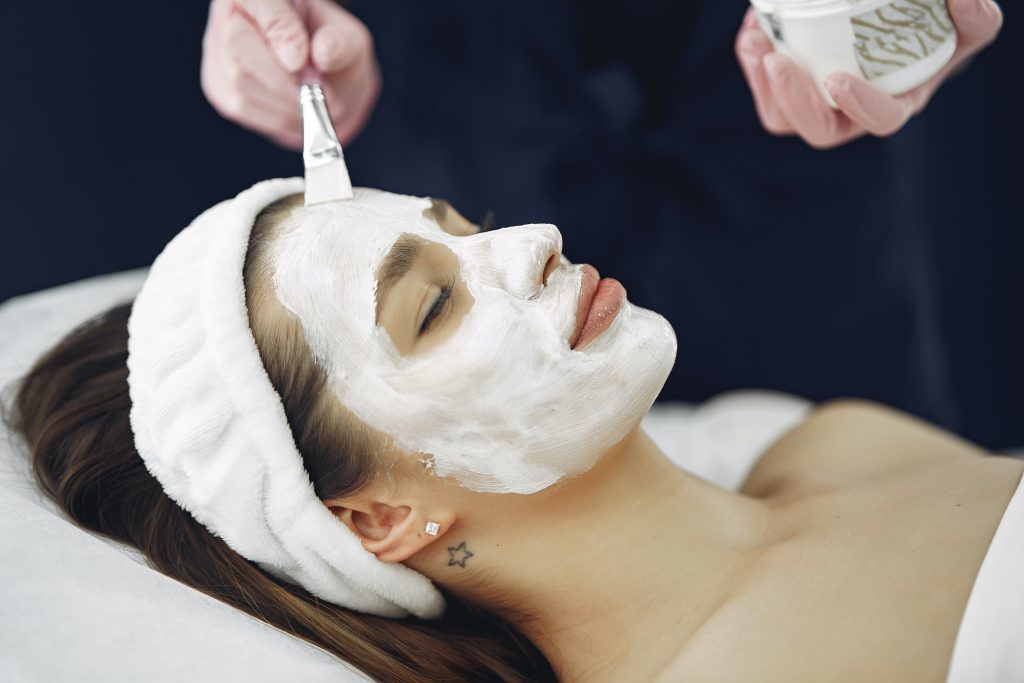Discover the latest studies and research on the effectiveness of DIY skincare.
Exploring the Effectiveness of DIY Skincare: Studies and Research

Are you tired of spending a fortune on skincare products that promise miraculous results but fail to deliver? Well, fear not, my friend, because the world of DIY skincare is here to save the day! In this article, we will dive deep into the realm of DIY skincare and explore its effectiveness, backed by studies and research. So grab your lab coat and let’s get started!
Understanding the Basics of DIY Skincare
Before we embark on this exciting journey, let’s first understand what exactly DIY skincare is all about. In simple terms, it’s the art of creating your own skincare products using natural ingredients found in your pantry or garden. From face masks and scrubs to serums and moisturizers, the possibilities are endless!
But let’s dive a little deeper into the world of DIY skincare. Did you know that people have been making their own beauty concoctions for centuries? Ancient civilizations like the Egyptians and Greeks used natural ingredients like honey, olive oil, and clay to enhance their beauty. These age-old practices have been passed down through generations and are now experiencing a resurgence in popularity.
So, why has DIY skincare gained such immense popularity in recent times? Well, my friend, the answer is simple – people are becoming more conscious of what they put on their skin. With the rise of “clean beauty” movements, DIY skincare allows you to have complete control over the ingredients that go into your products.
When you purchase commercial skincare products, it’s often challenging to decipher the long list of ingredients on the label. Many of these products contain synthetic chemicals, preservatives, and fragrances that can potentially irritate the skin or cause allergies. By making your own skincare products, you can avoid these harmful ingredients and tailor your formulations to suit your unique skin needs.
Another fascinating aspect of DIY skincare is the ability to customize your products according to your skin type and concerns. Whether you have dry, oily, sensitive, or acne-prone skin, there are endless ingredient combinations that can address your specific needs. For example, if you have dry skin, you can incorporate hydrating ingredients like aloe vera and coconut oil into your moisturizer. If you’re dealing with acne, you can create a face mask with antibacterial ingredients like tea tree oil and activated charcoal.
Moreover, DIY skincare can be a fun and creative process. It allows you to experiment with different ingredients, textures, and scents to find what works best for you. You can unleash your inner chemist and create products that not only nourish your skin but also provide a delightful sensory experience.
But before you rush to your kitchen and start mixing ingredients, it’s important to educate yourself on the proper techniques and safety precautions. While DIY skincare can be a fantastic way to care for your skin, it’s crucial to ensure that you’re using clean and uncontaminated ingredients. Additionally, knowing the correct ratios and methods of formulation will help you achieve effective and safe results.
So, are you ready to embark on your DIY skincare journey? Get ready to unlock the secrets of nature’s pantry and create personalized products that will leave your skin feeling nourished and radiant.
The Science Behind Skincare
Now, let’s geek out for a moment and delve into the fascinating science behind skincare. It’s important to understand the role of ingredients in skincare products and how our skin absorbs them.
Skincare products are not just a random mix of ingredients thrown together; they are carefully concocted blends designed to target specific skin concerns. Each ingredient plays a vital role in nourishing and improving the condition of our skin.
One key ingredient that has gained popularity in recent years is hyaluronic acid. This powerful humectant has the ability to hold up to 1000 times its weight in water, making it a fantastic hydrator for the skin. By attracting moisture from the environment and delivering it to the skin, hyaluronic acid helps to plump up fine lines and wrinkles, giving us a more youthful appearance.
Another group of ingredients that are commonly found in skincare products are alpha-hydroxy acids (AHAs). These exfoliating agents work by gently dissolving the glue-like substance that holds dead skin cells together, revealing fresh, radiant skin underneath. AHAs, such as glycolic acid and lactic acid, can help improve skin texture, reduce the appearance of acne scars, and even out skin tone.
When you make your own skincare products, you have the freedom to choose ingredients that cater to your skin’s unique needs. Whether you’re looking to combat dryness, reduce redness, or fight signs of aging, customizing your skincare routine allows you to address your specific concerns.
The Role of Ingredients in Skincare
Every skincare product is a carefully concocted blend of various ingredients, each with its own specific purpose. From hydrating hyaluronic acid to exfoliating alpha-hydroxy acids, these ingredients work together to nourish and improve the condition of our skin. When you make your own skincare products, you have the freedom to choose ingredients that cater to your skin’s unique needs.
For example, if you have dry skin, you may want to include ingredients like shea butter or ceramides in your DIY moisturizer. These ingredients help to lock in moisture and create a protective barrier on the skin, preventing water loss and keeping your skin hydrated throughout the day.
On the other hand, if you’re dealing with acne-prone skin, you might opt for ingredients like tea tree oil or salicylic acid. These ingredients have antibacterial and anti-inflammatory properties that can help reduce breakouts and calm irritation.
Understanding the role of ingredients in skincare products empowers you to make informed choices about what you’re putting on your skin. By selecting ingredients that target your specific concerns, you can create a personalized skincare routine that delivers the results you desire.
How Skin Absorbs Products
Our skin is a highly efficient absorber, capable of taking in whatever we apply to it. It’s like a thirsty sponge, eagerly soaking up the goodness (or not-so-goodness) from our skincare products. Understanding how our skin absorbs products is crucial when formulating DIY skincare recipes. By choosing ingredients with smaller molecular sizes, you can ensure better absorption and, consequently, better results!
When it comes to skincare, the size of the molecules in the ingredients matters. Larger molecules, such as those found in heavy creams or oils, tend to sit on the surface of the skin, providing a protective barrier but not necessarily penetrating deeply. On the other hand, smaller molecules, like those found in serums or lightweight lotions, have the ability to penetrate the skin’s barrier and deliver active ingredients to the deeper layers.
The skin’s outermost layer, known as the stratum corneum, consists of dead skin cells held together by lipids. To effectively absorb skincare products, the active ingredients need to penetrate this barrier. This is where ingredients with smaller molecular sizes come into play. They can easily slip through the gaps between the skin cells and reach the deeper layers, where they can exert their beneficial effects.
Additionally, the health and integrity of our skin barrier play a crucial role in absorption. A compromised skin barrier, often caused by factors like excessive exfoliation or harsh skincare products, can hinder the absorption of ingredients. It’s important to maintain a healthy skin barrier by using gentle cleansers, avoiding over-exfoliation, and incorporating moisturizers that help repair and strengthen the skin’s protective barrier.
By understanding how our skin absorbs products, we can make more informed choices when selecting skincare products or creating our own DIY concoctions. Choosing ingredients with smaller molecular sizes and ensuring a healthy skin barrier can enhance the effectiveness of the products we use and ultimately lead to better skincare results.
Research on DIY Skincare Effectiveness
Now, let’s address the big question: Does DIY skincare really work? We turn to scientific studies to shed some light on this matter.
Studies Supporting DIY Skincare
Several studies have shown that certain natural ingredients used in DIY skincare can indeed be effective in improving skin health. For example, a study published in the Journal of Dermatological Science found that honey has antibacterial properties and can help treat acne. Another study in the Journal of Cosmetic Science concluded that aloe vera gel has moisturizing and wound-healing properties. So, you see, science has our back when it comes to the effectiveness of DIY skincare!
Studies Questioning DIY Skincare
However, it’s important to acknowledge that not all studies sing praises for DIY skincare. Some studies raise concerns about the lack of standardization and potential risks associated with homemade products. These studies emphasize the importance of being mindful of ingredients, storage conditions, and proper formulation techniques to ensure the safety and effectiveness of DIY skincare. So, while DIY skincare can indeed be effective, it’s crucial to approach it with caution and do your research!
Comparing DIY Skincare to Commercial Products
Now, let’s put DIY skincare to the test and compare it to commercial products. We’ll look at two key factors: cost and effectiveness.
Cost Comparison
One of the most significant advantages of DIY skincare is the potential cost savings. Commercial skincare products often come with hefty price tags, mainly due to branding and packaging. On the other hand, DIY skincare allows you to create high-quality products at a fraction of the cost. Plus, you can customize your creations to suit your budget and skincare needs. Who says self-care has to break the bank?
Effectiveness Comparison
When it comes to effectiveness, DIY skincare holds its ground against commercial products. As we discussed earlier, homemade skincare products can be formulated with specific ingredients to target your skin concerns. Commercial products, while often effective, cannot cater to individual needs as effectively as DIY creations. So, if you’re looking for a personalized skincare experience that delivers visible results, DIY skincare might just be your best bet!
Risks and Benefits of DIY Skincare
As with any skincare regimen, DIY or otherwise, it’s essential to consider the potential risks and benefits involved. Let’s take a closer look.

Potential Risks and How to Avoid Them
One of the main risks associated with DIY skincare is improper formulation, leading to irritations or allergies. However, fear not, my fellow skincare enthusiasts, for there are simple ways to minimize these risks. Always research the ingredients you plan to use, follow reliable recipes, patch test new products, and remember to maintain proper hygiene during preparation. With a little knowledge and caution, you can sidestep these risks and enjoy the wonders of DIY skincare!
Benefits Beyond Cost-Savings
Aside from the obvious cost savings, DIY skincare brings with it a range of additional benefits. It allows you to be in control of what goes on your skin, ensuring the absence of harmful chemicals or questionable ingredients. Moreover, the process of creating your own skincare products can be incredibly therapeutic and fun! So, grab your mixing bowls and unleash your inner skincare chemist – it’s time to pamper yourself!
Conclusion
As we conclude our journey into the world of DIY skincare, we’ve seen that studies and research provide a solid foundation for its effectiveness. By understanding the basics of skincare, the science behind it, and comparing it to commercial products, we can confidently say that DIY skincare is a viable option worth exploring. With the right knowledge, precautions, and a sprinkle of creativity, you can unlock the potential of DIY skincare and embark on a delightful and rewarding skincare journey!





